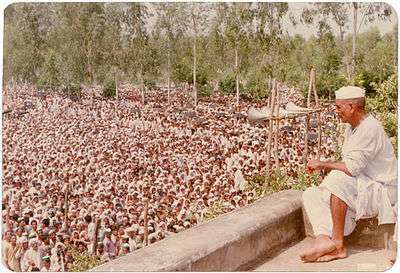Mahendra Singh Tikait
[1] [2][3] Mahendra Singh Tikait (6 October 1935[4]– 15 May 2011) was a noted Indian Jat leader of farmers from western Uttar Pradesh state. He was born in 1935 at village Sisauli in Muzaffarnagar District of Uttar Pradesh. He was the President of the 'Bharatiya Kisan Union'. Tikait was revered as the farmers’ "second messiah" after the late Prime Minister Chaudhary Charan Singh. [4] Tikait died in Muzaffarnagar in Uttar Pradesh on 15 May 2011 due to protracted illness from bone cancer at the age of 76. [5]
Title of 'Tikait'
The hereditary title of "Tikait" was apparently conferred on his family by the seventh-century emperor Harshavardhan. Since then the title has been transferred to the eldest son of the family. Tikait had become the "chaudhary" of Baliyan Khap at the age of eight after his father’s death. [4]
Leader of Peasants
Tikait emerged as the most powerful farmers' voice in North India. He shot into the national spotlight for the first time in 1987, when he gheraod the Karmukhera power house in Muzaffarnagar to demand the waiver of power dues of farmers.Tikait had led over a dozen major movements in Uttar Pradesh and Delhi, fighting for the cause of farmers. [6]
Movements
Boat Club Rally

Tikait's most spectacular show was at Delhi's Boat Club lawns in 1988 when nearly five lakh farmers from western UP occupied the entire stretch from Vijay Chowk to India Gate. Delhi's power elite held out till the stench became too much to bear and after a week, the Rajiv Gandhi government bowed to his 35-point charter of demands that included higher remunerative prices for sugarcane and waiving of electricity and water charges for farmers. The arrival of Tikait’s farmer league at New Delhi’s central vista was probably the most vibrant takeover of the capital by countrymen. They came pouring out of the western UP hinterland in tractor cavalcades and in next to no time, they had made the Boat Club lawns their vast bivouac. For a day or so, the government was in denial of Tikait’s determination to stage an extended sit-in. But when they began to pitch tents, install their mobile ovens and light little fires, and when their accompanying cattle began to make a bog of the lawns, Delhi sat up and took notice. They sang and danced by night; by day they sat listening rapt to their leader’s extended harangues. Delhi’s classes frowned at the chaotic disarray that broke out on the showpiece green lung of the capital. The government was at a loss to cope with the sudden avalanche of peasants in its well-ordered official district. But Tikait couldn’t care; he wasn’t going anywhere until he brought the capital down to accept his demands. He sat there, day after day, for a whole week, pulling on his hookah and from time to time, getting on the public address system to keep his flock engaged. He called the siege off only when Prime Minister Rajiv Gandhi held out promises that rang right to Tikait’s ears. It was the first time Delhi had been given a taste of doughty peasantry. [4] [5] [7]
Lucknow, 1990
In July 1990, Tikait reached Lucknow with a band of over two lakh farmers to urge the UP government to concede to the farmers' demand for higher sugarcane pricex and heavy rebates in electricity dues. The pressure tactics worked and the then Janata Dal government bowed down before his demands. [6]
Lucknow, 1992
In 1992, Tikait was back in Lucknow to stage a month-long sit-in panchayat in pursuance of his demand for writing off farmers' loans up to Rs 10,000. The same year, he launched a Farmers Land Compensation Movement in Ghaziabad, seeking higher compensation towards the acquired land of farmers. [6]
Bijnore, 2008 - Remarks against Mayawati
While conducting his movements, Tikait was arrested several times, the latest being in 2008. He was arrested on 2 April 2008 for allegedly making derogatory and caste-based remarks against Uttar Pradesh Chief Minister Mayawati at a rally in Bijnore on 30 March 2008. It took a contingent of 6,000 armed policemen to lay a siege around his village for his arrest. He was released only after tendering an apology to the CM. [6] [8] When things were back to normal, even Mayawati described Tikait, in a condolence message, as a "true and committed leader of farmers". [6]
About same Gotra marriage
Tikait had a firm belief in his caste's traditions and culture. Tikait even opposed the Supreme Court for holding such marriages valid. "We live by a moral code where honour has to be protected at any cost. Same gotra marriages are incestuous, No society would accept it. Why do you expect us to do so? Incest violates maryada (honour) and villagers would kill or be killed to protect their maryada," he had said in a TV interview.
See also
References
- ↑ http://scroll.in/article/732464/why-bjp-and-the-rural-distress-are-to-blame-for-the-violence-of-jats
- ↑ http://articles.economictimes.indiatimes.com/2011-05-15/news/29545739_1_bku-leader-sisauli-mahendra-singh-tikait
- ↑ http://www.outlookindia.com/article/as-pawns-circle-knights/294140
- 1 2 3 4 "‘Messiah’ for farmers who laid siege to capital". The Telegraph. 15 May 2011. Retrieved 29 May 2015.
- 1 2 "Tikait, farmer leader who laid siege to Delhi, dead". The Times Of India. 16 May 2011. Retrieved 29 May 2015.
- 1 2 3 4 5 "Tikait was the strongest voice for farmers in N India". Rediff News. 15 May 2011. Retrieved 29 May 2015.
- ↑ "Sugar siege melts Delhi Unceasing tide of farmers forces price review". The Telegraph. 20 November 2009. Retrieved 29 May 2015.
- ↑ Tikait arrested | 'Calling Maya names was a mistake'
External links
- Mahendra Singh Tikait Arrested before Surrender In Muzaffarnagar
- Mahendra Singh Tikait addressing a press conference in Mysore
- Tikait, supporters arrested to prevent BKU rally
- Tikait declares: Love marriages are dirty
- Tikait in THE HINDU
- Official information at NIC
|